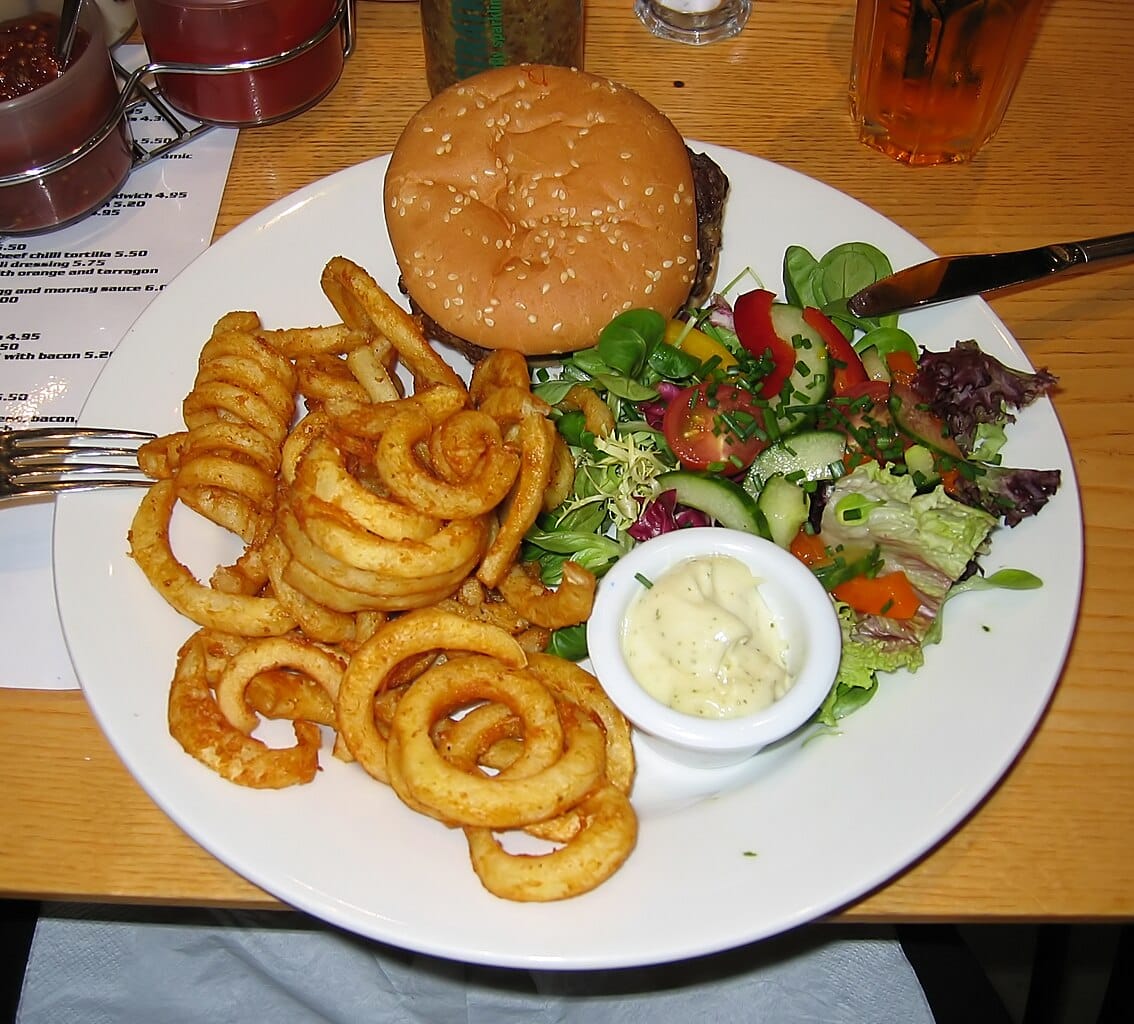lunch / luncheon / out to lunch

Lunch and luncheon have a confusing etymology. One might think that luncheon is the original, and that lunch is a clipping of it, but that doesn’t seem to be the case, even though the form luncheon is found earlier in the extant record. Both words originally referred to a hunk or thick slice of food, often bread or cheese. Most likely, lunch came first and that it evolved from lump, in an analogous fashion to hump and hunch and bump and bunch. Lunching or Luncheon is an extension of the shorter word, analogous to punch and puncheon and trunch and truncheon. The form luncheon is recorded in a 1571 French-English dictionary in the sense of a hunk or lump of food:
Lopin, a lumpe, a gobbet, a luncheon.
And we see the shorter lunch in Richard Percival’s 1591 Spanish-English dictionary:
Lonja de tocino, a lunch of bacon, Frustum, lardi.
This dictionary entry has given rise to speculation that the English lunch is from, or at least influenced by, the Spanish lonja, although there is no evidence to support this view other than this dictionary entry.
And we see a use of lunch in prose, still meaning a hunk or lump of food, in a 1616 translation of Charles Estienne’s Maison Rustique:
In the meane time he must not forget to take care of the dogges, and to giue them some reliefe & sustenance of the prey they haue gotten in hunting: vnto the bloud-bound, that is, vnto the dog which by his sent hath led the way to the Hart his lodging, he shall cast the head and the heart, as his right and due: vnto the rest he shall giue the necke and braine of the Hart, or which is better, he shall take bread and cut it into little lunches into to a panne with cheese, and temper the same both together with the bloud of the Hart in his greatest heat, and afterward put all this prouision forthwith vpon the skin, stretched forth vpon the grasse, and in the meane space euery man shall put his horne vnto his mouth, and therewithall comfort and cheere vp the dogges.
The verb appears as early as 1627 in William Hawkins’s play Apollo Shroving in a conversation between two characters, Captain Complement and his page Jack Implement:
Comp[pliment]. Is not the houre come appointed by mee to giue accesse and interviw to Sir Orgolio?
Imp[plement]. Yes sir, the sunne and clocke sayes so. (And my clocke tels me it is breakefast time. If I could tell where to lunch.)
And we get the sense of lunching as a between-meals snack in Richard Brome’s 1653 play A Mad Couple Well Match’d:
Here's one will hold me tack,
Seaven constant ordinaries every night,
Noonings, and intermealiary Lunchings,
At freedome every day, hold belly hold,
The Cupboord never shut.
Over time, the shorter form lunch was considered rather common, with luncheon being the norm in more polite society. But in the nineteenth century, this view of the words shifted, and the shorter lunch came into more regular and formal use, although luncheon still retains a more formal connotation than its shorter cousin.
The phrase out to lunch, meaning to be oblivious, unaware, or insane is an Americanism that arose in the mid-twentieth century. The literal meaning of dining out at midday is, of course, older, and the slang phrase is a metaphorical extension of that. One who is out to lunch cannot be in the office to conduct business. We see this metaphorical sense as early as 1946. From the 25 June 1946 issue of the Newark Star-Ledger:
When there’s an audience … it’s much worse. It’s not that her sense of humor and her love of a joke have gone out to lunch. It’s just that she doesn’t think some your tricks are funny at the times you pick to pull them.
And there is this from the world of Cold War politics in Harrisburg, Pennsylvania’s Patriot of 24 January 1950:
The way it stands now, Bob Taft wants to invade Formosa and the Administration is out to lunch. Since Bob became a knight in shining armor his laundry frank is sure heavy.
Robert Taft, son of the former president, was a Republican senator from Ohio who advocated for sending U.S. troops to Taiwan (Formosa) to defend it against communist China. The administration here was the Democratic Truman administration.
Sources:
A Dictionarie French and English. London: Henry Bynneman for Lucas Hrrison, 1571, sig. S2v. ProQuest: Early English Books Online (EEBO).
Brome, Richard. A Mad Couple Well Match’d. In Five New Playes. London: Thomas Roycroft for Humphrey Moseley, Richard Marriot, and Thomas Dring, 1653, 5.2, sig. G6v.ProQuest: Early English Books Online (EEBO).
“Bugs Baer.” Patriot (Harrisburg, Pennsylvania), 24 January 1950, 14/7. Readex: America’s Historical Newspapers.
Estienne, Charles. Maison Rustique, Or, The Covntrey Farme. Richard Surflet, trans. London: Adam Islip for John Bill, 1616, 689. ProQuest: Early English Books Online (EEBO).
Green’s Dictionary of Slang, n.d., s.v. out to lunch, adj.
Hawkins, William. Apollo Shroving. London: Robert Mylbourne, 1627, 2.1, 24. ProQuest: Early English Books Online (EEBO).
Oxford English Dictionary, second edition, 1989, s.v., lunch, n.2, luncheon, n., lunch, v.
Percival, Richard. Bibliotheca Hispanica. London: John Jackson for Richard Watkins, 1591, sig. P2v. Archive.org.
Woodward, Elizabeth. “Grown-Up Girls Not Keen for Roughhouse.” Newark Star-Ledger (New Jersey), 25 June 1946, 19. Readex: America’s Historical Newspapers.
Photo credit: Alisdair McDiarmid, 2005. Wikimedia Commons. Licensed under a Creative Commons Attribution 2.0 Generic license.